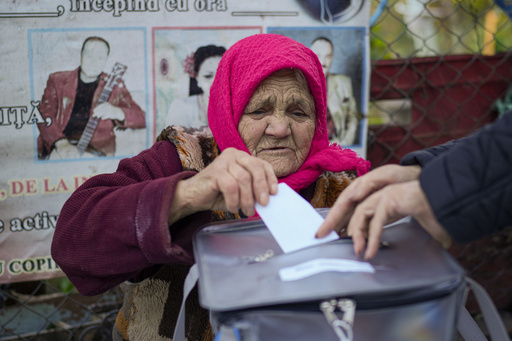
CHISINAU, Moldova — In a significant second round of presidential elections, Moldovans living abroad cast their votes in unprecedented numbers, ultimately leading to the re-election of pro-Western President Maia Sandu. This crucial election saw her face off against a candidate aligned with Russian interests, amidst ongoing allegations of Russian meddling, fraud, and voter intimidation.
Sandu’s success stemmed from her campaign’s promise to push for Moldova’s membership in the European Union, a move that has been widely supported by her government. Nevertheless, critics argue that her victory’s legitimacy is questionable, as it heavily relied on votes from expatriates, given that Moldova itself has a population of approximately 2.5 million, excluding citizens abroad.
With the votes fully counted from the runoff held on Sunday, Sandu secured 55.33% while her rival, Alexandr Stoianoglo, received 44.67%, as reported by the Central Electoral Commission. Notably, a record-breaking 327,000 citizens voted from abroad, with over 82% favoring Sandu. However, inside Moldova, Stoianoglo, previously the prosecutor general, garnered 51.3% of the local vote compared to Sandu’s 48.67%.
Moldova has been striving for a closer relationship with the EU since it signed an association agreement in 2014. However, years of widespread corruption and insufficient reforms have hampered progress, prompting many citizens to seek better opportunities overseas.
Igor Dodon, the former president and leader of the Socialist Party that backs Stoianoglo, quickly challenged the validity of Sandu’s victory, labeling her as the “president of the diaspora” in comments to a Russian state media outlet. He contended that this undermined the election outcome, emphasizing that Stoianoglo had triumphed within the borders of Moldova.
Dodon’s party later issued a statement on social media, rejecting the election results and branding Sandu as an “illegitimate president.” They asserted that her following exists primarily among her international supporters, indicating that many Moldovans feel deceived and disgruntled.
An expert in international relations, Cristian Cantir, pointed out that the response from pro-Moscow factions was predictable, given their historical criticism of the votes cast by Moldovans living abroad. He noted that such assertions of illegitimacy would reiterate Kremlin narratives, implying that pro-EU politicians lack domestic support and rely heavily on backing from the diaspora.
Moreover, Moldovan expatriates had a pivotal impact on a national referendum held on October 20, with a slim majority of 50.35% voting in favor of advancing the country’s EU aspirations. Moldova, along with Ukraine and Georgia, seeks EU membership while navigating a complex geopolitical landscape influenced by both Western and Russian interests.
In the wake of her reelection, Sandu lauded the electorate for demonstrating a commitment to democracy deserving of historical recognition. She acknowledged the significant participation of the diaspora, remarking, “Moldovans abroad have shown once again that Moldova beats as strongly in their hearts as it does in ours back home.”
Weighing the context of this election, she also highlighted the numerous challenges posed by external forces, citing accusations of monetary bribery, electoral meddling, and orchestrated attacks from criminal organizations from abroad.
The atmosphere surrounding both the October referendum and the recent runoff was marred by allegations of extensive vote-buying schemes and Russian interference, which brought to light the vulnerabilities of Moldova’s judicial system in safeguarding its democratic integrity.
Authorities revealed that a vote-buying operation was allegedly overseen by Ilan Shor, an oligarch residing in Russia who has been sentenced in absentia for fraud and money laundering. Shor has denied any wrongdoing, but prosecutors claim that $39 million was distributed to more than 130,000 voters through a sanctioned Russian bank during the electoral campaign. Anti-corruption measures have led to significant asset seizures and numerous investigations.
Josep Borrell, the European Union’s foreign policy chief, congratulated Sandu on her victory despite notable Russian interference attempts, including disinformation campaigns aimed at destabilizing Moldova’s democratic fabric and disrupting its EU aspirations.
One young Moldovan student, Artur, expressed hope that the government would heed the election results—especially the significant support for Stoianoglo within Moldova—suggesting this might motivate necessary reforms for the nation’s improvement.
Following Russia’s invasion of Ukraine in 2022, Moldova accelerated its efforts to join the EU, attaining candidate status in June of that year, with Brussels slated to commence membership discussions in summer 2024. This sharp shift towards the West has aggravated tensions with Moscow.
Moldova’s pro-Western administration, led by the Party of Action and Solidarity since 2021, will face a parliamentary election in 2025, which analysts believe could be a pivotal moment as Russia may intensify its influence to disrupt the government.
Mihai Mogaldea, from the Institute for European Policies and Reforms, emphasized the need for the EU to provide more financial support to Moldova, indicating that immediate assistance could positively affect citizens’ lives. He cautioned that despite current successes, ongoing efforts would be needed as true stability may only be achieved after the next parliamentary elections, which he views as a crucial battleground for influence.
